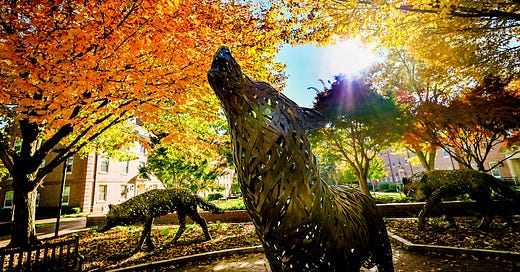Energy Spotlight, December 2024 Edition
This edition features an interview with Dr. Akdemir, a former club officer now at PNNL as an Earth Scientist, job opportunities, energy updates, and news from Hitachi Energy.
This month’s edition features an interview with Dr. Kerem Ziya Akdemir, a former Student Energy Club officer now working as an Earth Scientist at Pacific Northwest National Laboratory. This edition also includes current job opportunities in the energy field, the latest energy news from our officers and opportunities at Hitachi Energy. Enjoy the read? Subscribe to our Substack for free by selecting "No Pledge" for free access. We don’t want any payment, the Substack platform just offers the option.
An interview with Dr. Kerem Ziya Akdemir
In this edition, we interviewed Dr. Kerem Ziya Akdemir, an Earth Scientist in the Earth Systems Predictability and Resiliency group at Pacific Northwest National Laboratory. His research focuses on power system analysis and optimization using production cost and capacity expansion models, renewable energy integration, and risk assessment for climate change and hydrometeorological extremes like heatwaves and droughts. Driven by a passion for advancing power sector transformation and decarbonization, Dr. Akdemir develops machine learning and optimization tools to address energy and climate challenges. He holds a PhD in Civil Engineering and an MS in Natural Resources from North Carolina State University, along with a BS in Environmental Engineering from Middle East Technical University.
During our conversation, Dr. Akdemir shared valuable insights into his professional journey, research at Pacific Northwest National Laboratory, perspectives on energy and climate challenges, the importance of involvement in student organizations during doctoral studies, and practical advice for students. The interview, conducted via Zoom, is available as both video and audio formats—you can choose the format that suits you best. We are confident you will gain meaningful perspectives from this conversation with a former PhD student who is now actively shaping the field.
We have also highlighted some key moments of the interview below. Enjoy!
Interview highlights
Can you share your journey from being a member of the NC State Student Energy Club to your current role as an Earth Scientist at Pacific Northwest National Laboratory?
My interest in climate change during my undergraduate studies evolved into a drive to research decarbonization, renewable energy, and power grids. During my PhD, I joined the NC State Student Energy Club, where I enjoyed organizing events like energy panels and research presentations. These experiences, combined with my research on decarbonization planning under climate change, led to my role at Pacific Northwest National Laboratory.
How did your experience at NC State and as a club member shape your career path and research interests?
At NC State, I gained programming and energy modeling skills through coursework and research. The Student Energy Club provided valuable insights, newsletters, and networking opportunities, which helped shape my career path and research interests. Being part of the club was both fun and instrumental in broadening my understanding of the energy sector.
What does a typical day look like for you at Pacific Northwest National Laboratory?
My day involves developing and testing power system models, running simulations to mimic real-world investment processes, and analyzing results for publication. Collaboration is key, as I work with a team to tackle computational challenges. I also attend conferences to present findings and develop new ideas.
How do production cost models and capacity expansion models help address renewable energy integration and decarbonization?
Production cost models optimize power system operations, providing insights into generator outputs, electricity flows, and wholesale prices. Capacity expansion models guide decisions on building new generation and transmission capacities for a stable, cost-efficient, and decarbonized grid. Together, these models address operational and investment challenges.
What advice would you give students passionate about energy and climate change for building a successful career in this field?
Develop technical skills through university courses or online resources, stay updated on energy sector trends, and attend networking events. Connecting with professionals and mentors is vital to complementing your knowledge and opening career opportunities.
If you could give one piece of advice to your younger self while studying at NC State, what would it be?
Enjoy the process. Graduate studies are challenging but offer valuable opportunities for personal and professional growth. Remember to take breaks, spend time with friends and family, and pursue hobbies to maintain a healthy balance.
Energy News Updates
Henry - North Carolina’s newly constructed microgrid for EV Charging
Duke Energy, in collaboration with a developer (Electrada), has launched a Fleet Mobility Microgrid in Mount Holly, North Carolina, designed to support light, medium, and heavy-duty electric fleet vehicles. The facility includes a variety of generation sources including solar, hydrogen, battery storage. It includes six total fleet charging stations ranging from 120 kW to 300 kW, and two level 2 chargers. According to Duke, it is “the first U.S. depot designed for medium- and heavy-duty trucking with charging possible either from the bulk power grid or using 100% renewable energy from the integrated microgrid.” It has also created an opportunity to test and demonstrate fleet electrification technologies. Touted as a model for fleet electrification, the project should enable stakeholders to validate software and ensure vehicle-microgrid compatibility, further supporting the growing EV charging needs of the state.
Shiyue - “Drill, Baby, Drill”: Industry Leaders Temper Expectations
Despite political rhetoric invoking “Drill Baby Drill”, industry leaders and analysts agree that a surge in U.S. oil and gas drilling is unlikely. The United States has been the world’s largest oil and gas producer for the past six years, since the last Trump administration. Major producers like ExxonMobil emphasize financial discipline and optimizing existing operations over aggressive expansion plans. As ExxonMobil CEO Darren Woods noted, most companies are already maximizing production and see no immediate need for new wells, especially with crude oil prices remaining flat. Analysts like Peter McNally of Third Bridge echo this caution, pointing out that firms are focused on low-cost, high production wells rather than accelerating drilling rates. This skepticism within the industry suggests that the slogan may no longer align with current strategies, which prioritize profitability over volume-driven growth.
Hitachi Energy Job Opportunities
Hitachi Energy is actively recruiting for full-time positions and internships, with opportunities for NC State students and alumni. The next Partnership Powers Connection event will take place on February 11th, 2025, continuing their tradition of fostering collaboration and innovation. Building on the success of previous events, Hitachi Energy emphasizes its strong partnership with NC State to engage students, faculty, and alumni in driving energy advancements and career development. Don’t miss this chance to connect with a leader in the energy sector! Additionally, the Student Energy Club is planning a workshop in collaboration with Hitachi Energy to help students succeed at career fairs—stay tuned for more details!
Jobs/Internship Opportunities in the Energy Field
Energy Solutions - Energy Efficiency Program Manager II (Remote - IL)
NREL - Graduate (Summer) Intern - Women in Power System Transformation
As we wrap up the Fall semester, we want to express our gratitude for the incredible energy and enthusiasm our members have brought to the Student Energy Club. This semester has been filled with highlights, including our biggest event –Energy Week– which brought together students, faculty, and industry leaders for engaging talks, tours, workshops, and networking opportunities. Beyond that, we’ve stayed true to our mission by connecting students across diverse departments, hosting guest speakers, highlighting energy research, and building hands-on experience through exciting future projects. With your support, we’ve not only strengthened our community but also laid the foundation for a successful 2025. Thank you for making this semester so impactful, and we look forward to keeping the energy going next year! HAPPY LDOC!











